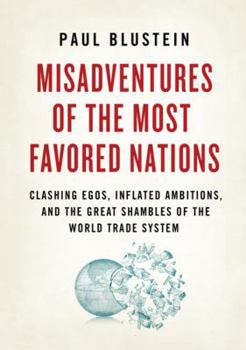Misadventures of the Most Favored Nations: Clashing Egos, Inflated Ambitions, and the Great Shambles of the World Trade System
Select Format
Select Condition 
Book Overview
As a linchpin of global capitalism, the World Trade Organization is both revered and reviled. In this book, financial journalist Paul Blustein tells the surprisingly entertaining and compelling story... This description may be from another edition of this product.
Format:Hardcover
Language:English
ISBN:1586487183
ISBN13:9781586487188
Release Date:September 2009
Publisher:PublicAffairs
Length:344 Pages
Weight:1.35 lbs.
Dimensions:1.4" x 6.1" x 9.3"
Customer Reviews
5 ratings
Provocative, detailed presentation of the impact of world trade
Published by Thriftbooks.com User , 14 years ago
Veteran journalist Paul Blustein blames half the 2008 economic meltdown - the non-Wall Street half - on dysfunctional global trade policies, and then he explains why. World trade is an arcane topic, complete with mysterious acronyms, complex rules, and negotiators with huge egos and serpentine negotiating positions pushed by antagonistic nations. In an increasingly global economy, trade negotiations are never simple. Even so, Blustein manages to tell this provocative, complex, depressing story as engagingly as possible. At times the book bogs down in negotiating points that only trade technocrats will appreciate, but Blustein fleshes out the story by capturing the quirky, sometimes volatile, personalities involved. Accordingly, getAbstract recommends his book to those who can't get enough about world trade. If you want all the ins and outs, you'll be very happy here.
Life: That's what this book gives WTO
Published by Thriftbooks.com User , 14 years ago
Most books about WTO are as stale as writing a short story with INCOTERMS. This is one of the few that provide insight into characters of the negotiators, hidden agendas and alliances, the trades of conditions that help craft final agreements, as well as presenting a global -- rather than just a US focus. Great work on the reporting of the Doha Round.
A great book
Published by Thriftbooks.com User , 14 years ago
One of the best books on the WTO I've ever read. Blustein explains in plain english the meanders and the technicalities of the world trade system and portraites the men and women who were ahead of the negotiations. Essential reading for understanding the WTO and the Doha round.
A great page-turner
Published by Thriftbooks.com User , 15 years ago
I have now read this book for a second time, not only for enjoyment but to get more from it. The reviews of Paul Blustein's previous books printed on the cover from the giants of financial periodicals (Wall Street Journal, Financial Times & The Economist)apply equally to this book. He exposes such apparently arcane subjects as WTO & IMF to frightening (The Economist's word)life to the unsuspecting public. I am currently reading Blustein's book on the IMF, for a second time & I can say the same about it.
From Abstract Trade Rules to Concrete Economic Outcomes
Published by Thriftbooks.com User , 15 years ago
"Next time you can bring a picture of an American farmer?" jabbed Kamal Nath, India's commerce and industry minister, during one tense negotiating session. "Because I have never actually seen one. I have only seen US conglomerates masquerading as farmers." Bringing pictures in and out of the World Trade Organization seems to be an acquired custom. When Pascal Lamy, the former European trade commissioner, was elected director general of the WTO, he brought down the poster-sized photos of GATT round completion ceremonies that adorned the corridor outside his office at Centre William Rappard in Geneva, and replaced them with abstract modern art. And as the WTO's July 2008 ministerial meeting collapsed into confusion and anger, Mexico's ambassador brought to the conference room a large black-and-white picture of Senator Smoot and Congressman Hawley, the two men who in 1930 gave their name to the protectionist tariffs that marked the descent of the world economy into the Great Depression. "Mr. Chairman, please put this picture on the front door. Ask the concierge not to let them into this building--and certainly not their spirits." Paul Blustein brings many portraits to his narrative, including those of an American cotton producer, an Indian laborer, and other individuals at both ends of of the chain that links abstract trade rules to concrete economic outcomes. Apart from Pascal Lamy, many officials who attended the Doha conference in November 2001 had left the scene or moved to other unrelated positions at the time the book concludes with a still unfinished 'Doha Development Agenda', as the ongoing round of WTO negotiations is called. Like the author, many people present at Doha wished they could have attended the completion ceremony, not only for the photo opportunity or in order to bring the narrative to a closure, but because much is at stake in the discussions shaping the future of the world trade system. A Washington Post journalist, Paul Blustein specializes in writing essays about the travails of international economic negotiations. In his foreword, he notes that as a book writer he is dependent on financial support from foundations or think tanks because his books have no prospects of hitting the best-seller lists. Oh yes, Mr. Blustein, they should certainly hit the list. And with a little faith in the general public's fair-mindedness, they will.





